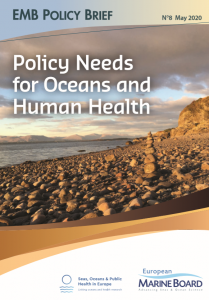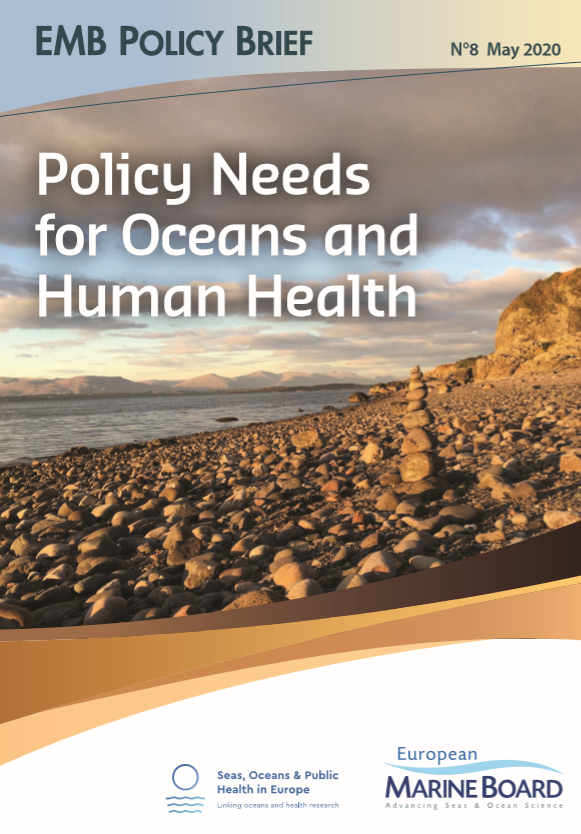On the 28th of May 2020, the European Marine Board (EMB) launched Policy Brief No. 8 on “Policy Needs for Oceans and Human Health”, produced together with the EU-funded SOPHIE (Seas, Oceans and Public Health in Europe) project.
The health of humans and of the ocean are inextricably linked. Humans can gain benefits from the oceans and its ecosystem services including food and energy, but their health can also be at risk from aspects such as storms and pollution. In turn, the health of the ocean can be significantly impacted by human activity, and therefore a balance needs to be sought to safeguard the health of both. However, at present, there is no policy at national or European level that explicitly addresses Oceans and Human Health.

 The Policy Brief on Policy Needs for Oceans and Human Health summarizes the policy challenges when attempting to address both ocean and human health together, and the cooperation and research needed to enable those challenges to be addressed. It proposes ways in which the existing regulatory framework could be adapted to incorporate Oceans and Human Health. It also provides recommendations relating to data and indicators, monitoring, funding and training.
The Policy Brief on Policy Needs for Oceans and Human Health summarizes the policy challenges when attempting to address both ocean and human health together, and the cooperation and research needed to enable those challenges to be addressed. It proposes ways in which the existing regulatory framework could be adapted to incorporate Oceans and Human Health. It also provides recommendations relating to data and indicators, monitoring, funding and training.
Recommendations
The Policy Brief is built on the recommendations highlighted throughout the course of the SOPHIE project, especially those presented in two project outputs: the Strategic Research Agenda for Oceans and Human Health in Europe, and the policy report, which examines how regulatory strategies and tools linked to the EU Integrated Maritime Policy relate to Oceans and Human Health.
The overarching recommendations for Oceans and Human Health are:
- To promote the development of a ‘Health (and Environment) in All Policies’ approach, the research community must champion such an approach and identify current shortcomings, taking into account equity and equality, using national and European science advice mechanisms and policy reviews;
- To link human health to ocean health policies, European policy makers should explore opportunities to reframe, adapt or reinterpret existing marine policies to incorporate Oceans and Human Health;
- To embed “marine” in the study and practice of Environment and Health, the Oceans and Human Health community must raise awareness, build the community, train and collaborate with interested parties;
- To design and implement dedicated Oceans and Human Health indicators, Oceans and Human Health researchers and relevant stakeholders need to cocreate appropriate indicators, monitoring approaches and management tools through collaborative projects and initiatives at all relevant scales;
- To support evidence-based management in an Oceans and Human Health context, the research community should develop dedicated data streams by identifying data sharing, management and harmonization needs within existing data frameworks;
- To build an integrated architecture for health and environmental data in Europe, the marine and terrestrial data management and health data sectors should collaborate to share best practices and lessons learnt, building on relevant ongoing activities at European level such as the European Open Science Cloud;
- To better understand the benefits of monitoring for policies covering both ocean and human health, the community in collaboration with economists and social scientists need to conduct cost-benefit analyses to justify the trade-offs;
- To safeguard both ocean and human health, the community needs to support policy makers to conduct systematic assessments to ensure feedback on data and indicators. To ensure consistency across Europe this might need to be coordinated at a European level; and
- To increase the support for Oceans and Human Health in research, sectoral and regional cooperation programmes, research funders should acknowledge the importance of Oceans and Human Health, and fund collaborative, transdisciplinary research that is co-designed by all stakeholders.

The Policy Brief can be downloaded here. A set of cartoons was also created especially for this publication by Jacob Bentley. You can download the full set of images here. A video, created by Seascape Belgium in the framework of the Seas, Oceans and Public Health in Europe (SOPHIE) project, stresses the need for more research in the area of Oceans and Human Health so that we can better understand the interactions that we have with our coasts, seas and oceans, and how these interactions impact our health and the health of the marine environment. It also calls on a growing community of diverse stakeholders to come together to advance Oceans and Human Health in Europe.
For more information please contact Paula Kellett, Science Officer, European Marine Board Email: pkellett@marineboard.eu.
The European Marine Board (EMB) is a leading European think tank in marine science policy. EMB is a network with a membership comprising over 10,000 marine scientists and technical staff from the major national marine/oceanographic institutes, research funding agencies and national networks of universities from countries across Europe. The Board provides a platform for its member organizations to develop common priorities, to advance marine research, and to bridge the gap between science and policy to meet future marine science challenges and opportunities. The Belgian Federal State is represented in the EMB by the Belgian Federal Science Policy Office (BELSPO) and in the EMB Communications Panel by the Royal Belgian Institute of Natural Sciences (RBINS).

